Castles of the Czech Republic: Castle Hluboka (part one)
If we follow the example of the American writer Mary Dodge, who in her novel “Silver Skates” called Holland “The Land of Weirdness”, then everyone will probably be able to give his equally capacious description to any other country. That's just how much it will be justified - this is another conversation. By the way, why did Mary Dodge call Holland "The Land of Weirdness or the Country of Contradictions"? In the novel itself, it lists them in set, but the biggest oddity catches the eye immediately and she also mentions her: “The stork, chatting with its chicks on the spire of the house, perhaps thinks that, since its nest is so high, he is in no danger; but the frog, croaking in the neighboring reeds, is closer to the stars than this stork. ” And at once it is clear why this is so ?! By the way, the same name - “The Country of Weirdness” can be given after all to our Russia, only the explanations here will, of course, be different. But what is the same short and capacious name you can think of for the Czech Republic? Well, of course, the overwhelming majority of Russians will answer - “The Czech Republic is a country of beer!” That's right, for all 100%, however, we will talk about Czech beer some other time. Now we will talk about locks and it is unlikely to be an exaggeration to say that the Czech Republic is also the Land of Castles. Throughout Europe, they are 15000, both completely intact and in the form of debris. But in a relatively small Czech Republic there are more than 2000! A lot, right? And this is despite the fact that all its territory is not strong and straining, you can freely drive a car in one day.
Castles in the Czech Republic are different. From some remained only picturesque ruins. Others live on them ... former owners, to whom they were returned by the Czech government after the communist regime collapsed in the country. Some castles belong to the state and are used for tourist and socially significant purposes.
Castle Deep. Sometimes, even in guidebooks in Russian, it is called Hluboka nad Vltava. But this is actually the name of a nearby town, not a castle. The main entrance.
Hluboka castle is a creation quite unusual both outside and inside and therefore deserving of the most detailed story about itself.
Well, it should start with the mention of the fact that it is located on a rock eighty-three meters high, towering above the Czech-Budějovice basin near the town of Podgrabi, and is mentioned in written sources already in 1285 year. That is, it was founded in the XIII century and, like all the castles of that time, was a fortified dwelling of local feudal lords, and the medieval story its quite interesting and instructive in every way.
In the XIII century, it was called Frauenberg and belonged to the nobleman Cech of Budejovice. For ambitious kings from the genus of Przemysloviches, this castle was an obvious "eyesore" until the "iron and gold" king Premysyl Otakar II (1253 - 1278) simply confiscated it for its royal needs. A few years later, the castle was given to someone Budiva, a descendant of Witk from Prczyce, the direct ancestor of the powerful Rožmberk family, who also had other lands in South Bohemia. After his death, his two sons, Vitek and Zavish of Falkenstein, owned a castle — an extremely powerful and ambitious man. Having appeared by the will of fate at the throne of the young King Wenceslaus, he not only became his favorite, but downright subordinated him to his will, so much so that Zavish decided all his affairs, and the king only signed the documents he had compiled. Moreover, the widowed queen Kunguta, who even secretly married him, could not resist his charm!
Let's walk around the castle, going to the right of the main entrance through the park, and when we finish it, we will see this - the romantic metal balcony between its two rear towers.
However, Zavish soon realized that as soon as the young king matured, his rapid career could end in one day, and began to strive for marriage ... with a young Hungarian princess located at that time outside the monastery walls. The papal curia in the Vatican became indignant, the widowed queen struck jealousy, and the matured king simply ordered Zavish to be arrested and thrown into prison. To this unfriendly step, the feudal lords of South Bohemia noted a mass uprising, since they saw in it their leader and guardian of their interests. The king set out to suppress the rebellion, putting Zavish in an iron cage. She was exhibited in a prominent place at each rebellious castle and declared that if his ruler did not immediately express submission to the king, then ... this man would immediately be beheaded. This reception (which certainly does honor to the young monarch) acted flawlessly right up to the castle of his brother Vitek. He saw his brother in a cage, and heard the threat of cutting off his head, replied: “Hack!” And King Wenceslas had nothing to do but how to bring his threat into execution. And in 1290, he was executed right in front of his own castle in the so-called penalty meadow.
View of the castle from the southeast.
Soon after this, Hluboka Castle became again part of the royal property of Premyslov, but not for long. In 1310, it was again mortgaged because of the extravagance of the then king and bought out of the pledge only by Charles IV, an enlightened Czech monarch, and because of the importance of the castle, they made it on a special list of inalienable royal property that even subsequent heirs could not have mortgaged or sold it !
We continue the detour from the south-east to the north-west, the benefit here is the path goes right along the building ... Ahead is the castle chapel.
However, nothing came of this intention, since the period of the Hussite wars soon began and Hluboka Castle began to pass from one hand to another, even when the Hussites themselves had already been smashed long ago! In the Renaissance, the castle was renewed in the fashion of that time, but due to the exorbitant debts of its then owner in 1598, it was sold to the rich rural landowner Bohuslav Malovetsu of Maklovits, which caused considerable malice among the neighboring, but impoverished nobility.
The style in which the castle chapel is built is rather eclectic. There are elements of Tudor Gothic, and later Elizabethan Renaissance motifs, but the general style is English.
When this purchase in 1601 was recorded in land books, Hluboka represented a lucrative estate with a castle, an extensive farm yard, a vineyard, hmelnitsa and vegetable gardens, a brewery and a mill, with a sawmill, a water pump, fish ponds and hunting grounds. However, this purchase did not bring happiness to the vain Bohuslav. When the Thirty Years' War began in 1618, Catholics everywhere began to exterminate Protestants and take property from them, and he and his children just turned out to be Protestants and suddenly lost everything. At first, Gluboka came to Emperor Ferdinand II, and he presented it to the Spanish General Don Balthazar de Marradas as a reward for his works. However, this gift was “so-so”, since in its description it was said that “the castle from the military people on glass, stoves, locks and doors, destroyed and looted”.
Covered passage to the winter greenhouse.
General Marradas, being a knight of the Order of Sts. John, and, above all, a military man, ordered to build in front of the castle a special building called Fructus Belli ("The Fruits of War"). Under him, the defense system of the castle was strengthened, a ditch lined with stone was deepened and a drawbridge was built leading to the gates of the new building. However, his heirs Hluboka didn’t like it, in 1661 the manor was sold, “namely the castle, that is, the city of Hlubok, together with the courtyard - with everything that was in and around Hluboka built and improved” 85 000 gold Jan Adolf von Schwarzenberg, who received the title of imperial earring in 1670 year, and who had already acquired a manor nearby the year before.
Since Schwarzenberg was a large family, over time, there was an urgent need to share all the property belonging to her. And this is how it is often shown in the novels of Agatha Christie (and the films made for them!) The whole family gathered and decided to divide land property in half between the elder ancestral branch headed by Joseph Schwarzenberg and the youngest, headed by Charles I Schwarzenberg. Representatives of the first went to Hluboká, Třebo and Cesky Krumlov, the second to the castles of Orlik and Zvikov. It happened in the 1802 year and since then Hluboka Castle, up to the Second World War, belonged to the older generic branch of the Schwarzenberg so the Second World War.
But the most so-called “golden page” in the history of the castle should be considered the time from 1833, when it fell into the hands of Prince Jan Adolf II Schwarzenberg and his wife Princess Eleanor from Liechtenstein. He was an educated man, made a brilliant career and was a skillful manager. During his visit, extensive land reclamation work was carried out in the surrounding marshes, the fields were fertilized, new crops were bred, sugar factories, breweries and cheese factories were built. All this later led to the mechanization of production in the estate, as a result, at the end of the XIX century, in the lands of Prince Schwarzenberg, entire 13 cheese-makers and the 3 milk factory were already working.
And then he, accompanied by his wife, who was not inferior to her husband with her mind and was an absolute trendsetter in court society, in 1838, on behalf of the emperor, went to England on a visit to Queen Victoria. There they traveled throughout the country and ... were literally fascinated by English architecture and especially by the royal Windsor Castle. As a result, upon returning to their estate in 1838, they began a complete restructuring of their neo-gothic castle in the English style.
And this is already the building of the greenhouse itself, where the restaurant is now located and numerous shops and shops for tourists.
In accordance with the plans that had been commissioned by the Viennese architects, he had to resemble the old English castle at Windsor - the family property of the British royal family. It was not possible to achieve exact similarity, but, nevertheless, a beautiful white three-story building in the shape of an elongated quadrangle with two courtyards and more than a dozen jagged towers grew on the site of the old castle. The construction work was completed by the year 1863, and since then the view of Hluboka Castle has not changed much to this day.
Here also sits such a modern sculpture. Original, what to say!
The last owner of the castle was Hluboka Prince Adolf Schwarzenberg, who took possession of them in 1938 year. Immediately after the start of the Second World War, he went abroad and never returned to his homeland. In 1940, the German state secret police received all the property of the older family, and a German steward was appointed to the castle. 8 May 1945, all property of the senior Schwarzenberg was nationalized. As a result, Hluboká Castle first came under the jurisdiction of the district administration in České Budějovice, and then in 1974, by the decision of the Regional People’s Committee, it was transferred to the Regional Center for State Protection of Monuments. His current successor is the National Institute for the Preservation of Monuments, in whose administration the castle is today.
The courtyard of the castle and the doors to the main staircase. On the walls there are sculpted heads of deer with the real horns hunted by the castle owner! To take a picture of this place without people you have to try very, very hard!
To be continued ...
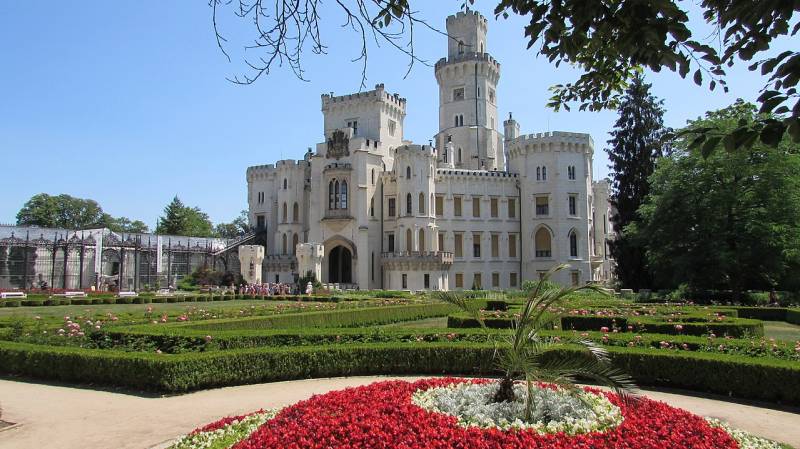
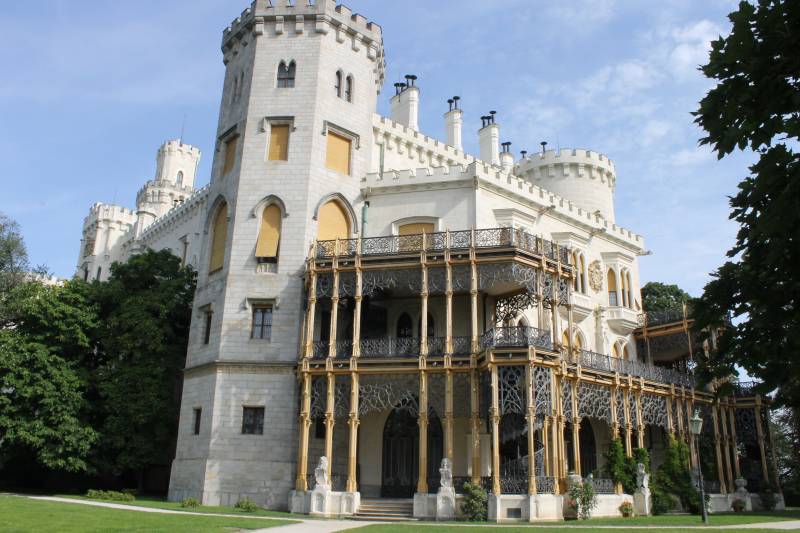
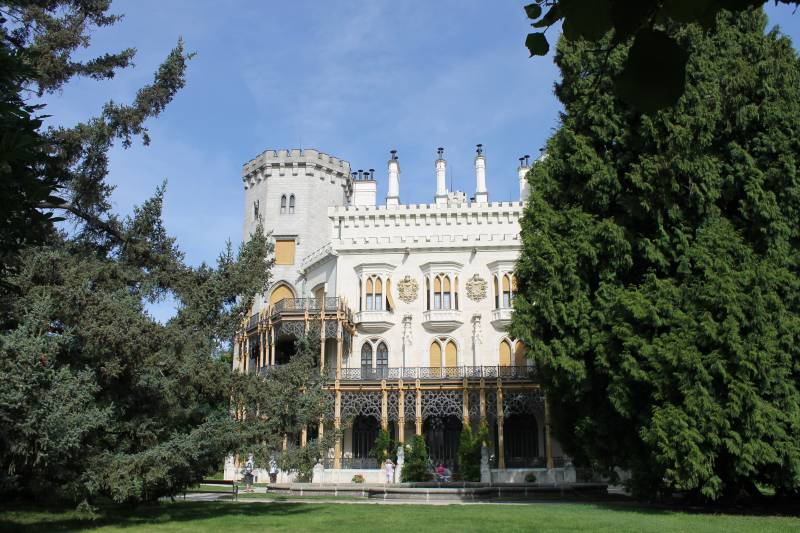
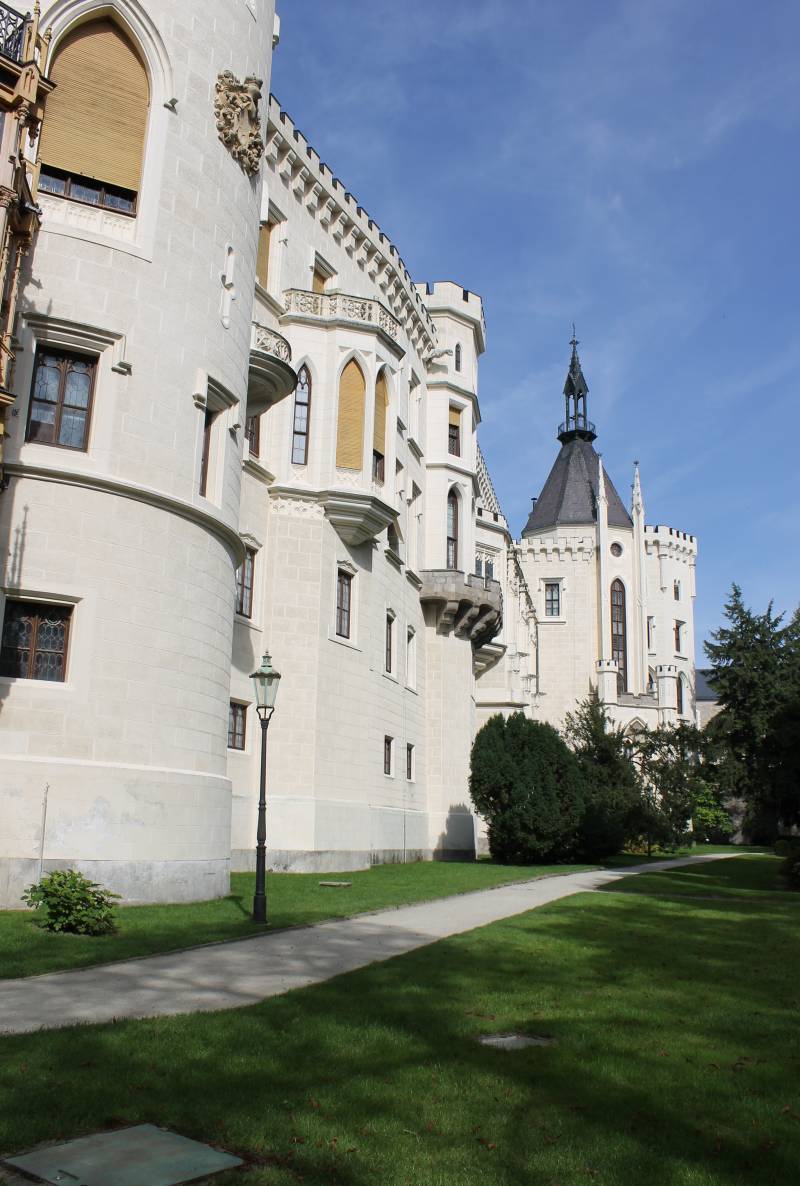
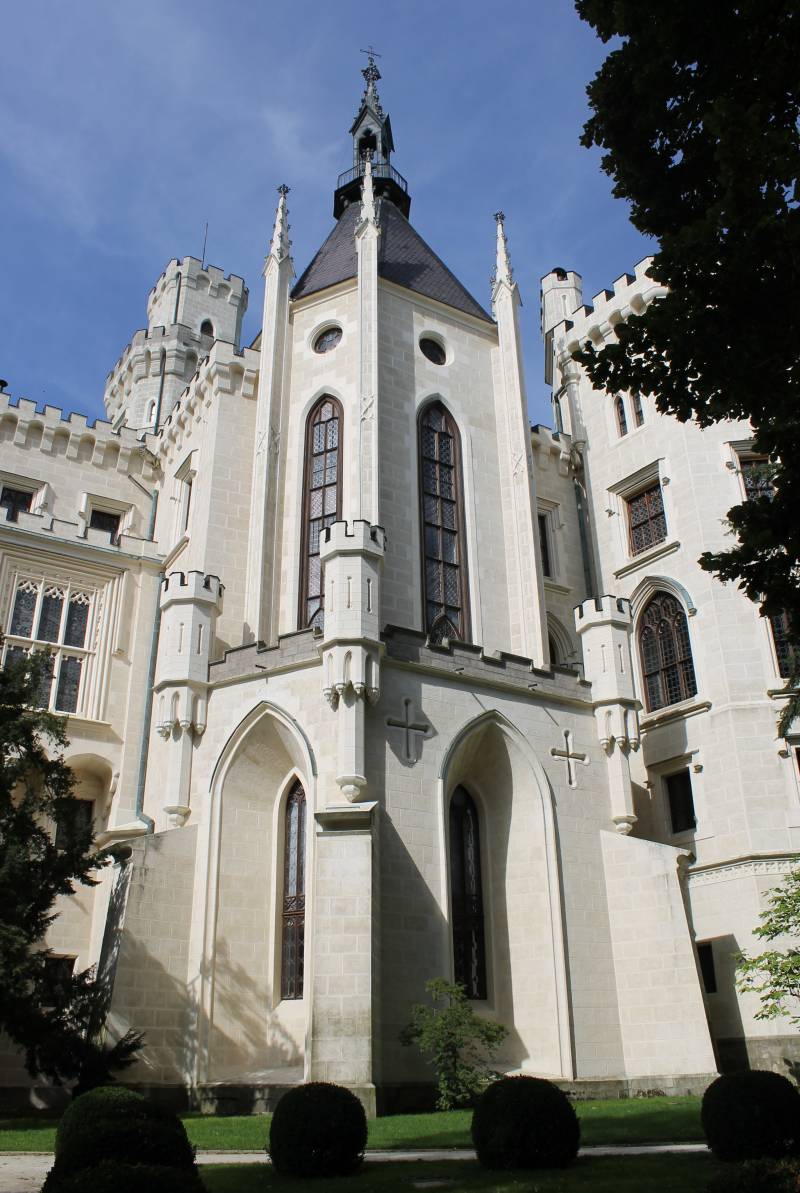
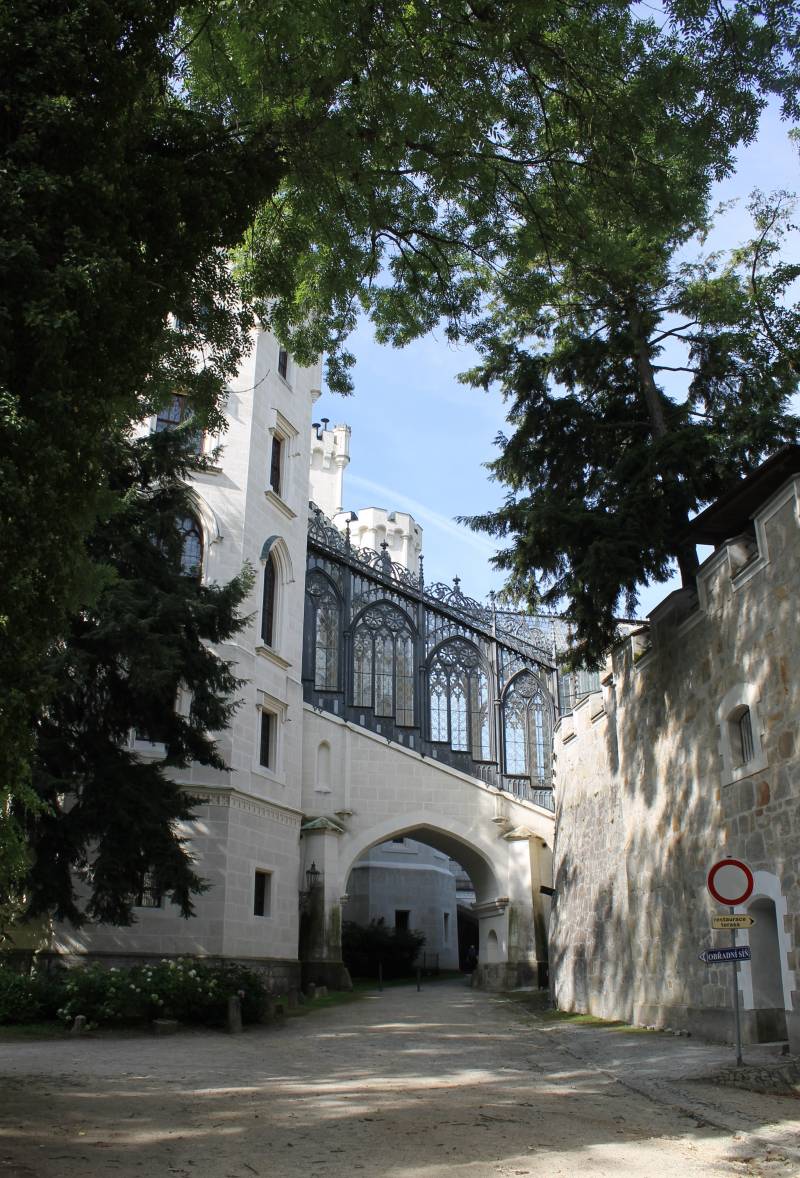
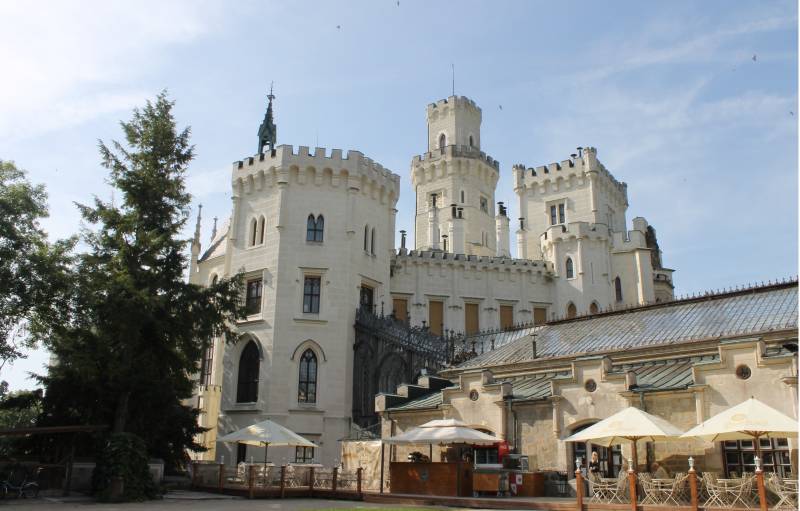
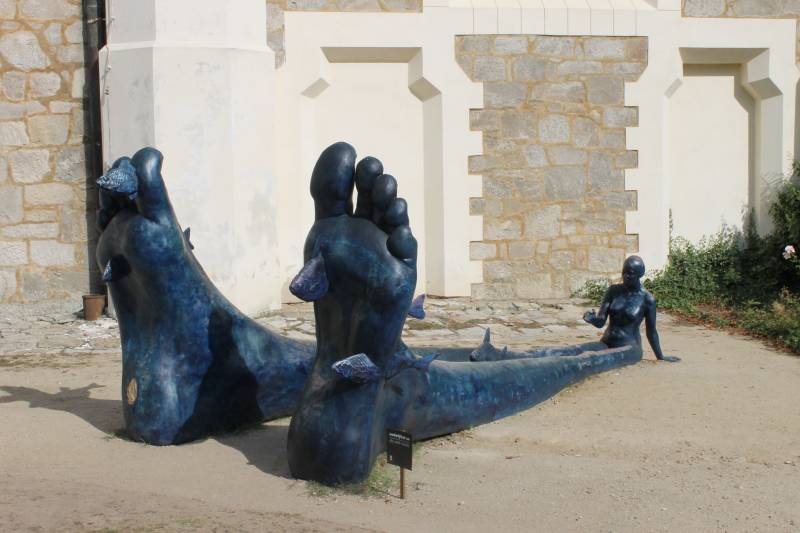
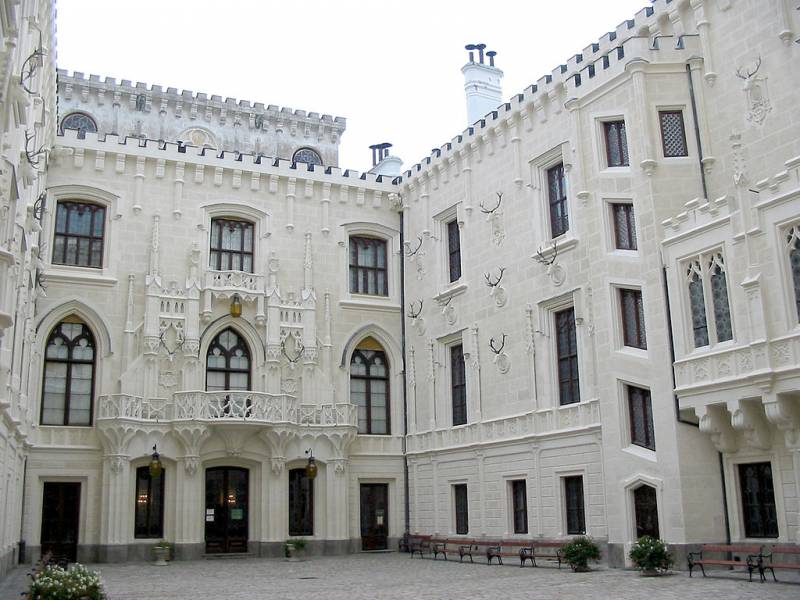
Information